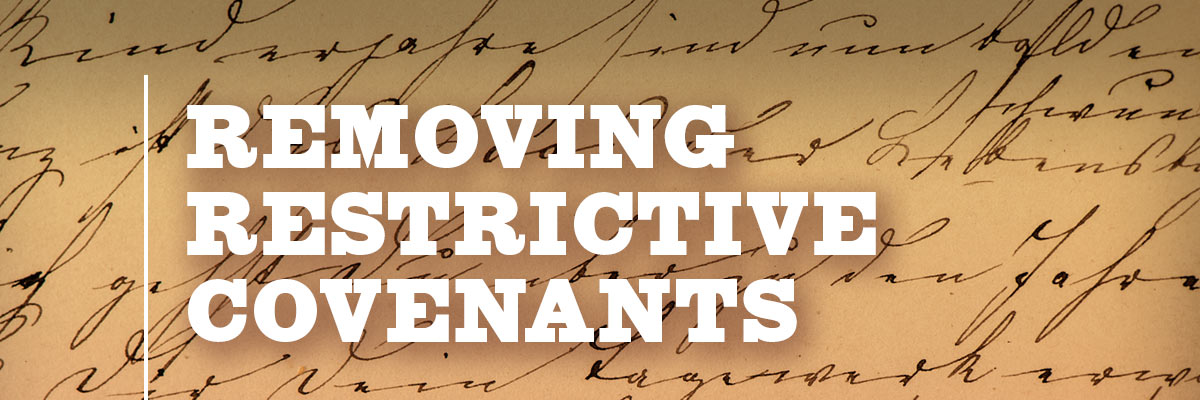Restrictive Covenants to Be Removed From Virginia Land Records
July 24, 2020

The Commonwealth of Virginia has a rich history, one that is hard to ignore as you travel the highways, by-ways, and back roads. It is the home to Presidents; leaders of the movement to independence; leaders of the civil rights movements; leaders in business, science, technology, and innovation.
However, Virginia also has a painful past. Specific to land and property, it’s a past that for generations legally excluded many Virginians from owning homes, land, and living in parts of Virginia.
Restrictive covenants that were prohibitive of minorities, women, and certain nationalities still can be found throughout Virginia in our land records. We have seen some dating back to the 1800’s, while others as recent as the early 1960’s.
The Virginia REALTORS® 2020 President, Kemper Funkhouser, challenged the Virginia REALTORS® Government Relations team to come up with a way to rid us of these offensive and derogatory covenants. At almost the same point, the Virginia Legislative Black Caucus Chairman Lamont Bagby, from Richmond, came to us with the same request.
We viewed this as an important opportunity to help Virginians amend some of the wrongs of our past and strengthen our sense of community.
The Virginia REALTORS® Government Relations team worked extensively with Delegate Bagby (D-Richmond) and Delegate Marcus Simon (D-Fairfax) on a bill to help rid us of these covenants.
The result was House Bill 788, which provides for a method to remove these statements from land records prospectively when they are found.
This was no easy task. Land records and the act of recording land records go back to the earliest days of our Commonwealth and our nation. The oldest recorded land records in Virginia date back to 1623, in Eastville, VA, on the Eastern Shore. There are literally tens of thousands, if not hundreds of thousands, of individually recorded deeds and plats that wind through the 1600’s all the way up to today. These are, in many cases, historical documents that help us tell the story of how Virginia, and indeed, the United States grew.
For many years, real estate lawyers, lenders, and historians viewed these records as historical and, only in rare cases, able to be altered.
For those reasons, we needed to be creative and look for other ways to deal with these records, but we had to do it in a way that wouldn’t hold up transactions or wouldn’t delay closings. No easy task…
After tough negotiations and after many hours of research and drafting, we came up with a process of allowing a “Certificate of Release” to be recorded with a deed that was found to include restrictive covenants that are in conflict with the Virginia Fair Housing law.
How does it work? When a property owner, a buyer, or a title company discovers a restrictive covenant that is in conflict with our Fair Housing law, they will submit a form with the deed recordation that specifically cites the covenant, the page number of the deed book, etc. The new deed that is recorded will remove that language. So, going forward, those deeds will not have the language in them.
House Bill 788 is yet another example of the Virginia REALTORS®’ efforts to come to the General Assembly with solutions to problems. It may take time and it may take effort, but when we take on an issue, it’s because we know it is the right thing to do. The Virginia REALTORS® Government Relations team will continue working to ensure that our members’ voices are heard as the laws and regulations that shape our industry are made.
You might also like…
Governor Appoints Martin Johnson to Virginia Housing Commission
By Robin Spensieri - July 5, 2024
On July 3rd, it was announced that Governor Glenn Youngkin has appointed Virginia REALTORS® Chief External Affairs Officer Martin Johnson to the Virginia Housing Commission. Effective immediately, Martin… Read More
VA Signals Temporary Suspension on Buyer Agent Payment Ban
By Virginia REALTORS® - May 24, 2024
Earlier this week NAR announced breaking news that the Department of Veterans Affairs (“the VA”) has signaled a temporary suspension on buyer agent payment bans. While the VA… Read More
It’s Primary Election Time in Virginia!
By Maura Pratt - May 22, 2024
REALTORS® play a crucial role in helping to protect the interests of the real estate industry. One of the ways REALTORS® can do so is making sure they… Read More